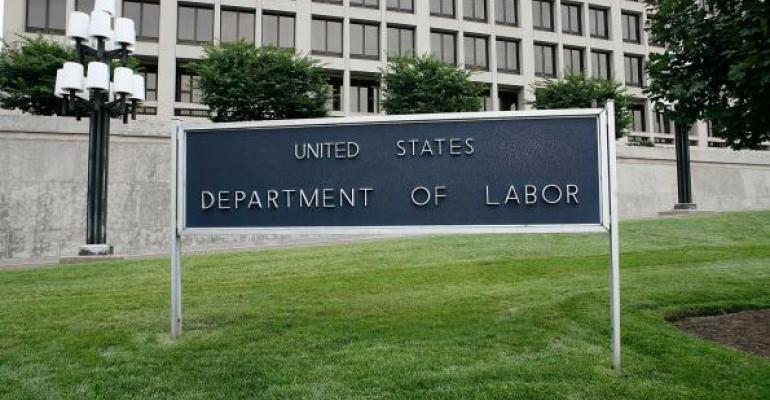It’s taken the better part of a decade for the Department of Labor to get its fiduciary rule in place and it’s finally here. Despite a 60-day delay of the rule’s applicability date and speculation that lawmakers may scrap it altogether, two prongs of the final rule, one expanding the definition of who is a fiduciary and another establishing impartial conduct standards, go into effect today.
Labor Secretary Alexander Acosta announced in a Wall Street Journal op-ed May 22 that the department wouldn’t further delay the June 9 applicability date. But he didn’t rule out further review of the rule.
In addition, enforcement is still up in the air. In a field assistance bulletin, the DOL explained, “[D]uring the phased implementation period ... the department will not pursue claims against fiduciaries who are working diligently and in good faith to comply with the fiduciary duty rule and exemptions, or treat those fiduciaries as being in violation of the fiduciary duty rule and exemptions.”
Here’s how industry executives and advisors reacted to the rule taking effect:

 “While it is possible that the DOL will propose major changes to the rule or even propose to repeal it, we believe both outcomes are unlikely. The DOL was meticulous in building a strong legal and regulatory foundation for it that will not easily be undone. Moreover, many firms have already expended considerable resources to get ready for the rule. They will not be eager to spend more to undo those efforts or conform to a new set of requirements.” —Blaine Aikin, executive chairman at Fi360, which provides fiduciary-related training and tools
“While it is possible that the DOL will propose major changes to the rule or even propose to repeal it, we believe both outcomes are unlikely. The DOL was meticulous in building a strong legal and regulatory foundation for it that will not easily be undone. Moreover, many firms have already expended considerable resources to get ready for the rule. They will not be eager to spend more to undo those efforts or conform to a new set of requirements.” —Blaine Aikin, executive chairman at Fi360, which provides fiduciary-related training and tools
“The best advisors are already acting as fiduciaries for their clients and are considering overall fees as a component of the investment strategies they deploy. For these advisors, I think this is great news and the services they’ve already been providing should help translate into more clients with minimal changes to their current processes. This is going to be a challenge for ‘advisors’ that sell products.” —Steve Leivent, senior vice president of advisory client experience for SS&C Advent
 “While we are disappointed in this latest development, we agree with the guiding principles Secretary Acosta outlined: that Americans should be trusted to make their own decisions about retirement planning advice, products and services they need; that the rule should benefit the investing public, not the plaintiffs’ bar and that the DOL should take full advantage of the SEC’s expertise to craft a better rule.” —Dale Brown, president and CEO of the Financial Services Institute
“While we are disappointed in this latest development, we agree with the guiding principles Secretary Acosta outlined: that Americans should be trusted to make their own decisions about retirement planning advice, products and services they need; that the rule should benefit the investing public, not the plaintiffs’ bar and that the DOL should take full advantage of the SEC’s expertise to craft a better rule.” —Dale Brown, president and CEO of the Financial Services Institute
 “Think of it like the Hippocratic Oath for retirement investing. When you go to the doctor, you expect to receive nonconflicted medical advice, which is always in your best interest. When you seek retirement advice from a financial professional, you should also expect the advice to be in your best interest.” —Rob Foregger, co-founder, NextCapital
“Think of it like the Hippocratic Oath for retirement investing. When you go to the doctor, you expect to receive nonconflicted medical advice, which is always in your best interest. When you seek retirement advice from a financial professional, you should also expect the advice to be in your best interest.” —Rob Foregger, co-founder, NextCapital
“With a decent amount of advisors entering the latter part of their career, I think we will see some advisors who would have to make big changes due to the DOL rule exit the industry earlier than they may have otherwise. If this occurs, others like myself will be given the opportunity to serve even more who need a planner for the long term.” —Kimberly Young, a financial planner in Worthington, Ohio
“The Q&As issued by the DOL present the concept known as ‘clean shares’ as being a likely future best practice in the sale of mutual funds. ‘Clean shares’ are basically no-load mutual funds shares that will allow the broker to charge a commission it deems in compliance with the fiduciary duty rule. However, the DOL acknowledges it will take time for brokers to develop business models that use clean shares and other innovative market products. In any event, it is expected that the commissions charged post-fiduciary duty rule will be significantly lower than the commissions charged under the current structure.” —Charles Field, co-chair of Sanford Heisler Sharp's Financial Services Litigation practice





